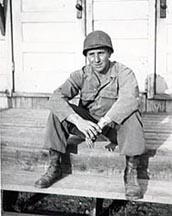
Established April 14, 1942
 |
American Ex-Prisoners of War
A not-for-profit, Congressionally-chartered veterans’ service organization advocating for former prisoners of war and their families.
Established April 14, 1942 |


Basic Training, Camp Blanding, FL 1943
|

Emil and Rita participating in the POW Daisy Drive, 1998
|
|
| Last Name | First Name, Middle Init. | Nickname |
| Street Add. | City | State |
| Zip | Spouse | |
| Conflict | Branch of Service | Unit: |
| Theatre of Operation | Military Job | Where Captured |
| Date Captured | Time Interned | Camps |
| Date Liberated | Medals Received | Age at Capture |
| After the War ... | ||
He landed on Omaha Beach on D-Day+6 and was assigned to the 30th Division, 117th Infantry, A Company as a replacement in the heavy weapons section. After heavy fighting with the Germans, the 30th was able to secure the town of St. Lo and proceeded on through France to Mortain to relieve the 1st Division. German strafing and heavy tank movement forced the soldiers to use most of their munitions. With low ammunition and food supplies and a large concentration of German soldiers in front of them, the platoon was finally forced to surrender on August 7, 1944.
For three months, Emil and approximately 75 other prisoners were confined to a German box car and were taken from Paris to Stalag VIIB in Memmingen, Germany. Very little food, cramped conditions and no toilet facilities were a way of life in these boxcars.
In October 1944, the prisoners were moved to Augsburg, Germany to become part of Arbites Kommando #663B, a work camp where they made shingles for bombed-out German buildings. Emil remained in this camp until April 27, 1945 when he was liberated by Patton's troops. Because the work camp was not registered with the U.S. Army Air Corps, it was bombed often. Barracks were lost but there were no POW fatalities.
During his six months of captivity, Emil and the other POWs in his camp received humane treatment from one of the German guards, Otto. He would follow the directions of his superiors but never over-emphasized his position with the POWs. He would often bring them bread and food from the local farmers and the POWs would trade their cigarettes and chocolate for these items.
On April 24, 1945 Emil and the other POWs in his camp were moved as the Americans closed in on the area and the Germans were forced into hasty retreat. Several of the POWs convinced the German guard, Otto to remain with them and surrender to the Americans. They, in turn, wrote a letter for him reassuring the Americans that they had not been mistreated by him.
Emil was liberated on April 27, 1945, returned to the United States and went back to work for Van Norman Machine Tool Company, where he had worked prior to the war. He also served as an Auxiliary Policeman for the town of East Longmeadow, MA, where he lived for most of his life.
Emil and his wife, Rita, have three children: Patricia, Richard and William, five grandchildren and four great-grandchildren. They are life members of the AX-POWs and actively participate in many POW-MIA activities.
Emil is a life member of the DAV, the 30th Division Association and the 30th Division, North East Chapter. They regularly volunteer for the ex-POWs in Western Massachusetts and have been instrumental in establishing several memorials in local cities to honor the POW-MIA veterans in that area.
Emil served as Commander of the Western Massachusetts Chapter from 1985-86, 1987-88, and 1997-1998. Rita is the chapter historian. He also served as the Massachusetts State Commander from 1990-1991. Their volunteer activities include the VA Medical Center in Northampton, MA and the Holyoke Soldiers' Home in Holyoke, MA.